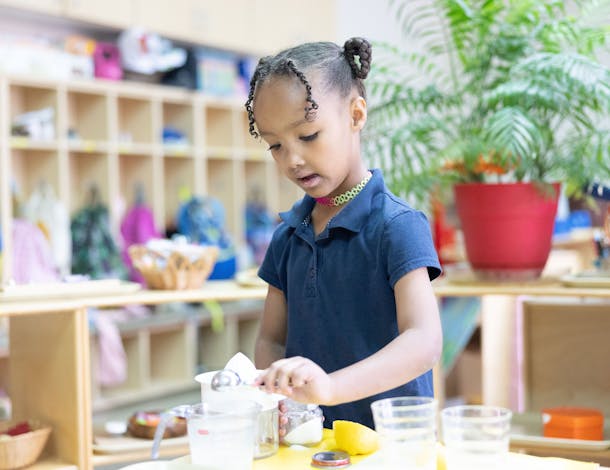Traditional homework is kept to a minimum.
Learning at Home
Montessori Schools do not typically assign daily homework.
Dr. Montessori believed that if we do not dictate the work of the child in class, then it does not make sense to dictate the work they choose at home. Therefore, traditional homework is kept to a minimum.



“A fundamental truth permeates Montessori’s work: children are desperate to learn. In a Montessori class, children are motivated to discover why and how things work. Therefore, homework, in a Montessori sense, is work that the child does at home, as an extension of his or her educational exploration“(Hektor, L 2010)
We know that parents are a child’s first teacher; this comes with a great deal of responsibility and it is a relationship that doesn’t end when a child enters school. Real learning is not limited to the schoolroom and children need to see their family’s excitement for learning and real-world applications, in order to fully reach their potentials.
Even though we do not require traditional homework at MMA, we do encourage activities, which constructively direct a child’s pursuits during home hours, while nurturing their interests and building family bonds. Science fair, continent studies and other interest-based or cultural focused projects encourage independent learning along with research and writing skills. The presentation of these projects builds confident public speakers and creates an atmosphere of high interest learning. These monthly and long-term “home projects” are best completed with an adult as a guide and resource for the child, helping the child to meet the expectations set forth.
We also ask that children read and write daily. Reading is established as a time set aside for reading whatever children find interesting (either individually or aloud), and writing is either in a journal or involves freely chosen creative or expository writing exercises.
We may also ask that children practice spelling words or math concepts at home. In fact, many activities may constitute homework, including household chores. Responsibilities at home help the child develop language skills and cultural awareness. Making math a real part of the home environment (pairing socks and counting by twos; dividing a pizza into equal pieces; shopping and making change) and giving the child a voice in family decisions are important to the child’s perception of math concepts and economic geography.
The goal for the Montessori family’s homework is to be practical, purposeful and continuous; spending quality time inspiring children’s natural curiosity and love for learning. This requires considerable parent participation, understanding of the Montessori philosophy and regular communication with the school.












